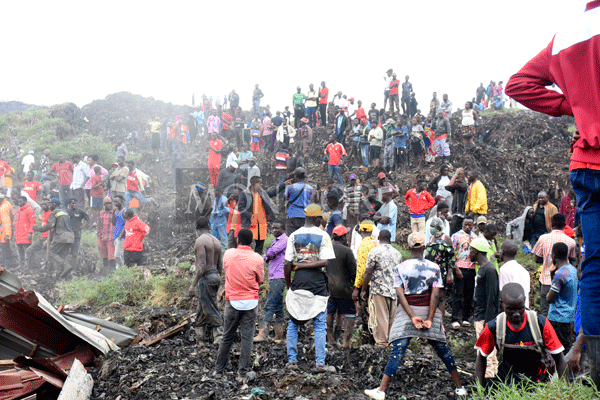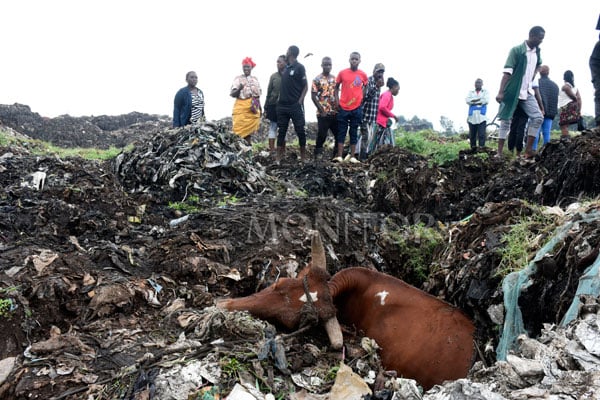
Kampala Capital City Authority (KCCA) Executive Director Dorothy Kisaka. PHOTO/FILE
On Saturday, the Kiteezi landfill in Wakiso District collapsed, killing at least 25 people and destroying several properties.
In an interview with Daily Monitor’sDamali Mukhaye, Kampala Capital City Authority (KCCA) Executive Director Dorothy Kisaka provides insights into the events leading to the collapse and the steps the Authority is now taking to prevent likely future disasters.
What explains the Kiteezi landfill disaster, and what key factors contributed to the collapse?
Kiteezi was set up in 1996 and it is a 28-year-old landfill and over time, it has grown. As the population around the city has increased, the pressure on the landfill has exponentially grown. As at 2017, the tonnage of waste was only about 700 or 600.Now we are at 2,500 tonnes.
So, the pressure of KCCA and the neighbouring administrative areas, that is Kiira, Mukono and Wakiso, are all served by Kiteezi.
Now with the rains that came, this mountain of rubbish collapsed. I mean, in simple ways of explanation, that’s what happened. And we cannot sustain this kind of situation. We have to move away from dumping, in the way we’ve been doing in Kiteezi, and turn waste into energy.
Where are you taking the garbage next?
There is the option of Nkumba in Entebbe and there is an option of Menvu in Nansana, so the Wakiso leadership, led by the CAO [Chief Administration Officer] are right now with our teams of KCCA looking at the possibilities, even the minister of Kampala, so that we make a quick decision of where this is happening. Kampala City produces 2,500 tonnes of garbage every single day, so we cannot lose a day without dealing with garbage. It must be dealt with immediately.
Some stakeholders warned KCCA about a likely catastrophe at the Kiteezi landfill and had a budget allocated by the government to manage it, what did the money do?
We had purchased a very beautiful space of about 135 acres in Dundu, Mukono District way back in 2015. The plan was then to relocate Kiteezi to Dundu, but the residents of Dundu, rose up in arms and sued KCC and said you cannot bring another Kiteezi here, which is valid. And so, right now, we are looking at Kiteezi as the alternative space that we can use for the plant. In different cities, I’ve seen such plants in residential areas and they are clean because they just convert the waste into clean forms of energy or manure or other by-products that come from the waste.
So, we are hoping that that can be done at Kiteezi and we don’t create another damping space in Dundu. We are moving away from the whole thing of dumping. That is the way to go. We cannot sustain it. Of course, in the short run, we have to continue because we are not ready. But ultimately, our new strategic plan that we are designing right now has no plan for landfills. We are moving from waste to energy.
Are you going to compensate the locals that were affected by the landfill?
I think let us wait for the Cabinet paper for that. Mine is after seven days. You will know once we present the Cabinet paper. We are managing a crisis right now. Let us just manage the crisis for now and we are going to be meeting every day. By the way, tomorrow we are here again at 10 o’clock maybe. This is a developing story. So there is nothing set in concrete. We are inventing as we go along to manage the crisis and then go into a longer-term solution.
What is KCCA’s position on the ongoing demolition of houses in the vicinity of the Kiteezi landfill?
One of the decisions that was made today is that we should create a buffer zone around the dumpsite of 200 meters. So everybody who is within the 200 meters, should vacate. We are putting a red line at 200 meters. As a minimum level, it should really go on for a kilometer. But for now, because of the rains, we want everybody to be moved out of their houses and accommodated in the emergency response centre or alternative spaces so that the excavation can go on.
And also, we save lives. People should not die because the rains are coming down and the dump is still very, very delicate. And so, we don’t want it coming down and destroying more lives.
President Museveni ordered an investigation into the Kiteezi landfill disaster. Has this investigation taken place, and what findings have emerged regarding negligence and the potential for preventing the incident?
Yes, yes, I am very much aware that the IGG [Inspector General of Government] was ordered to look into this matter and I think they would produce a report. We are open. We look for value for money, we have zero tolerance for corruption. We want people to deliver on their jobs. So, we are open. We welcome the investigation, and we shall support it.
What measures will be implemented to ensure that garbage from the Kiteezi landfill does not contaminate the nearby Lake Victoria at Nkumba?
We are very, very conscious of maintaining a hygienic environment. And, the challenge is just these seven days of management, the initial seven days of the crisis and that’s why we’re looking at Nkumba because it’s already established. But we’re looking for a more long-term solution.
In Menvu, Nansana it was gazetted as a dump place to manage solid waste. So that is the longer-term solution, which will be prepared as a landfill for now. But ultimately, we have to move away from landfills. It is not sustainable. Globally, all cities are turning waste into energy, into manure, and into other usable waste.
So, that is where KCCA is going. We’ve been championing and we are championing a smart city agenda. And one of the things that we are talking about is the wellbeing of people by looking for solutions that create an environment that’s sustainable, air quality, infrastructure, and all those things. So we must move from dumping to conversion into energy.
What measures is KCCA implementing to address the issues at the Kiteezi landfill and prevent future disasters?
This morning, we held a meeting which the Prime Minister chaired, and we were guided by the engineering teams that there is a methodology that we are going to utilise to strengthen the existing area. I cannot explain it technologically, but they guided us.
Does KCCA have a smart system in place for managing garbage, similar to the practices seen in smart cities?
Plans have been on. Our records show that as late as 2012, there was a plan to have a public-private-partnership (PPP) around decommissioning Kiteezi itself but it was not successfully completed because they needed government guarantees, which could not be given at that time. And Ms Beti Kamya, who was the minister at that time, presented a Cabinet paper on this matter with clear plans on how we plan to solve it. So the government has been preparing for this and is very much aware of what is needed and has been preparing. And right now we are in a situation where that plan is coming to fruition.
As guided by the prime minister, when government sits on Monday [next week], they’re going to go through the Cabinet paper, which is going to talk about the comprehensive plan of dealing with solid waste management in the city and in the cities, because it is not a unique problem, but it is a national problem with the new cities that have come up. As the populations of cities rise, solid waste management must be addressed. As a nation, we consume a lot of organic food and organic food by nature produces a lot of waste. So it must be dealt with. So we must look at all the solutions. The solutions are not just about dumping. There are solutions about leaving some of our produce out of the city so that people can go out of the city to purchase it.






